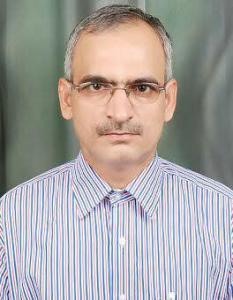Dr. KPS Rana believes in innovation, strives for perfection and appreciates dedication. One of the stalwarts of the ICE division at NSIT, Dr. KPS Rana has pioneered many projects and inspired many students towards research and innovation. His classes never see a dull moment and those who study under him can swear by their fundamentals. He had served the Indian Space Research Organisation (ISRO) for over 7 years before joining NSIT. Here’s what he has to say about NSIT’s then, now and the future.

Q1. You have been a part of this Institution for over 15 years. What are some essential differences in NSIT then and now?
The main differences have been the addition of three new departments i.e. IT, BT and Management, creation of an advanced centre in each department, introduction of the unique teaching-cum-research fellowship scheme. Also NSIT has seen an increase in the student intake. Moreover, numerous contributions to international level publications are being made, by the NSIT family now.
Q2. According to you, how does NSIT compare with other engineering colleges? What are some of the changes that you wish could be incorporated?
Since its inception, NSIT has been a prestigious academic institution, and is ranked very high at the national level. Unfortunately, we still have a very old syllabus structure being followed which needs an urgent revision. With the advancement in technology, there should be a regular revision every five years. Quality associated with the laboratories is always an added advantage for a good teaching and learning environment. Also, there is a need for addition of new PG programmes in various disciplines.
Q3. What have your key research areas been?
I usually work in a team along with other colleagues. The areas of research broadly include Sensor Modelling, Digital Signal processing, Robotics Modelling and Control, Intelligent Instrumentation, Virtual Instrumentation, Real Time Systems, FPGA Applications etc.
Q4. What are some of the research projects undergraduate students have undertaken under your guidance?And how do you select students for the same?
On the aforementioned areas, we take students from UG level also. Interestingly, some of the students have performed exceptionally well and their work has been published in international journals. We usually work on hardware based projects and encourage students who are enthusiastic and can devote several hours in the lab. As a prerequisite, the candidate should have a good command on the LabVIEW/ MATLAB environments and an inclination towards measurement and control engineering. We believe ‘A process can only deliver good quality products if its parameters can be efficiently controlled and its parameters can only be controlled efficiently if they can be measured precisely’. In a way it is in line with the “Make in India” vision of the government.
Q5. What changes do you expect in behavior/outlook of students towards these projects?
We always find a huge number of candidates who want to work. In fact, many students approach us as early as in the 5th semester itself, and we find difficulty in sparing time for all of them. The students who have qualified from our laboratories and are working in the relevant industry/studying MS are totally satisfied with their works. When the students visit us back and tell us their success story, even we are encouraged and feel satisfied to a great extent. In my opinion the key reason for this satisfaction is the challenges the design, measurement and control industry offers in contrast to a routine job. This inspires one to undertake further research.
Q6. How do these projects contribute to a student’s knowledge in your opinion?
As industries always prefer students who have had exposure to hardware, there is nothing better than working on an actual hardware to realise your ideas. I have noticed many times, that students always desire to work on the hardware which they will use in the industry tomorrow. With this type of hardware exposure, there have been many instances where our students have secured placements in many leading industries which usually do not visit campus.
Q7. Your name has been listed in Marquis Who’s Who in 2011, you have written for many international journals, and been a part of many conferences. What would be your advice to students who wish to have such similar impact in research field?
A researcher is essentially required to have a thorough understanding of international level peer papers and the ability to propose some novel technical enhancements or improvements in the existing techniques or propose some new and efficient methods in a specific domain. It is a difficult task which requires dedication and motivation for decades. At the end of the day if we can contribute to mankind, it proves to be the most satisfying of actions.We always encourage honest efforts in this line. We believe India can grow much higher with the in-house developed precise instrumentation systems and technologies. In the modern era, nothing technical can be achieved without precise measurement and control systems. Measurement and control engineering domain, being completely indus- trial in nature, can make significant contributions to the economy of our country.
Q8. You have for long been associated with IEEE. So, what role IEEE publications can play/should play in bringing the field of engineering education at par with global standards, in India?
With the advent of internet these days, it is very easy to know what the leading academic institutions are doing from all over the world.IEEE also publishes research articles on the need and requirements of the current course frameworks and associated laboratories in various domains. We, being a part of the IEEE family, can take the advantage of these findings for setting our goals. This will bring our engineering education at par with global standards.

